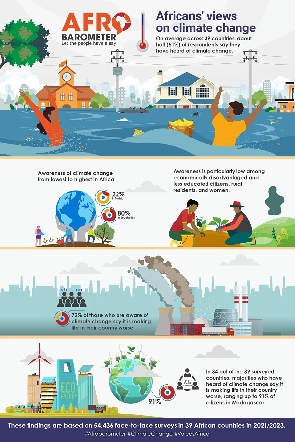Afrobarometer, Africa's leading survey research organization, is set to make a significant impact at the 2023 UN Climate Change Conference (COP28) by spotlighting the voices of African citizens captured in its recent Pan-Africa Profile on climate change.
This underscores the organization's commitment to fostering a more inclusive and informed global conversation on climate action.
“In amplifying the voices of African citizens, we aim to bring a nuanced understanding of the unique challenges and opportunities faced by communities across the continent,” said Afrobarometer CEO Joseph Asunka. “We have also developed climate change country cards that provide a detailed snapshot of each nation's progress and challenges in addressing climate change.”
On Wednesday, Afrobarometer Director of Communications Nafissatou Ndiaye Diouf and Communications and Knowledge Manager Josephine Sanny will host a briefing session at the Climate Innovation Zone for an audience of global sustainability leaders in the civil society, business, government, and development sectors.
The 90-minute session will zoom in on Afrobarometer's latest research in 39 African countries, which captures Africans' awareness of climate change, their experiences with deteriorating weather conditions, and their expectations regarding climate action from governments, developed countries, and other stakeholders.
The findings reveal that over the past decade, many Africans have experienced more severe droughts and floods. Yet these experiences do not necessarily translate into greater awareness of the climate threat: Only about half of survey respondents say they have heard of climate change.
For Diouf, including African voices in the global conversation on climate change is not just about representation; it's about recognizing the wealth of knowledge and lived experiences that our communities bring to the table.
“The Afrobarometer survey findings on climate change offer an opportunity to enrich the dialogue and ensure that solutions are truly reflective of the diverse realities within Africa,” she said.
On Thursday, the Afrobarometer team will join Devex at the Climate+ Summit for a deep dive into discussions on tackling climate change and related challenges.
Among Africans who are aware of climate change, most expect their governments to take the lead in dealing with its causes and consequences – and to do so more decisively than they have to date.
Citizens are prepared to support government measures to limit climate change, even if they are expensive or cause harm to the economy. But Africans also expect “a lot more” climate action from business and industry, developed countries, and ordinary citizens, underscoring their view of climate change as a shared global challenge.
“Afrobarometer’s new Pan-African Profile on climate change is a testament to our commitment to understanding, addressing, and mitigating the impacts of climate change in Africa,” Sanny said. “In fostering awareness and collaboration, we pave the way for informed decisions and resilient, sustainable futures."
Afrobarometer’s participation at COP28 goes beyond showcasing its rich trove of data, aiming to empower citizens to actively participate in the global conversation on climate action for meaningful impact and change.
“As Afrobarometer brings Africans’ views on climate change to the forefront of COP28 discussions, we hope that Dubai will be the turning point where we move from promises to real progress,” Asunka concluded.
Press Releases of Thursday, 7 December 2023
Source: Afrobarometer

















